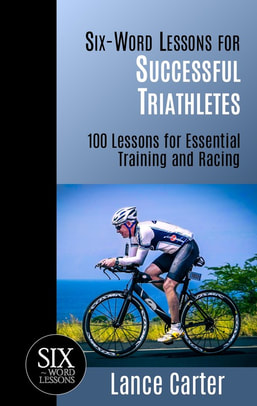 1. Dude, don’t take yourself so seriously 2. Engage in your training with seriousness When I wrote my recently released book, “Six-Word Lessons for Successful Triathletes: 100 Lessons for Essential Training and Racing” I positioned these two lessons at the very beginning of the book because I wanted to remind people that triathlon should exist in our lives to enhance the experience of living and that it should not become our life. I’ve seen too many people take their training and racing so serious that they literally lose friends and destroy relationships. At first glance it may seem that these two lessons contradict each other when in fact they work in concert with each other. Each workout you do should have a purpose. Sometimes the purpose is simply enjoyment of the activity and sometimes it’s merely social. Other times, especially if you are training for a particular race and/or have performance goals, you’ll need to cover a certain distance or hit certain speeds for predetermined distances. Taking your training serious means you understand the purpose for each workout and you understand how each workout combines with the rest of your training schedule to get you to your goal. It means when you train, you do so with intention and you are present in the moment. Training in this way connects you with something bigger than yourself and as corny as it may sound, it helps you live a more fulfilling life. Endurance sports have the power to boost self-esteem and personal confidence. When a person crosses the finish line of a race they are not the same person that toed the line at the start. The longer the race, the more dramatic the effect. It’s why nearly every person that has finished their first Ironman will tell you it changed their life. If I may quote myself, “Crossing the finish line is just the beginning of a new you.” When it comes to taking ourselves too seriously this is a lesson we usually have to learn the hard way. It’s great that you have a new found love for your new sport, and it’s great that you want to share your experience with the world but do it with awareness. Your triathlete friends are likely to be just as happy to talk to you all day about your training and racing; what flavor of GU you prefer and your favorite chamois cream. Your non-triathlete friends however, have a very limited desire to hear every little detail of your training and to take up the entire conversation. Know your audience. Share appropriately. I’ll give you a lesson that I learned the hard way in hopes that it saves you some grief. When your friends or family come to watch one of your races which is about as fun as watching paint dry, the last thing they want to hear for hours and days after the race is how you could have been faster if only……. yada, yada, yada. They simply want you be happy and they want to know that you enjoyed your day. And when you go on and on with what sounds like complaining they legitimately begin to wonder why they gave up their entire day, weekend, and in some cases vacation to support you; only to have you bitch about it. Even if you have the worst day ever, thank your friends and family for coming and tell them how much it means to you. Save the “what if’s” and “could’ve beens” as well as the second guessing of your training for your triathlete friends. After all, they’ve been there too and know what you are going through. That doesn’t mean you don’t share parts of the race with your non-triathlete friends, just not every single second. Keeping these lessons in mind will help you enjoy the sport of triathlon for many years to come!  Lance Carter is a triathlon coach as well as a nine-time IRONMAN® triathlon participant who has been training and racing since 1993. He is the author of Six-Word Lessons for Successful Triathletes. See more at lancecartercoaching.com.
0 Comments
Your comment will be posted after it is approved.
Leave a Reply. |
See the Authors!
All
|

 RSS Feed
RSS Feed